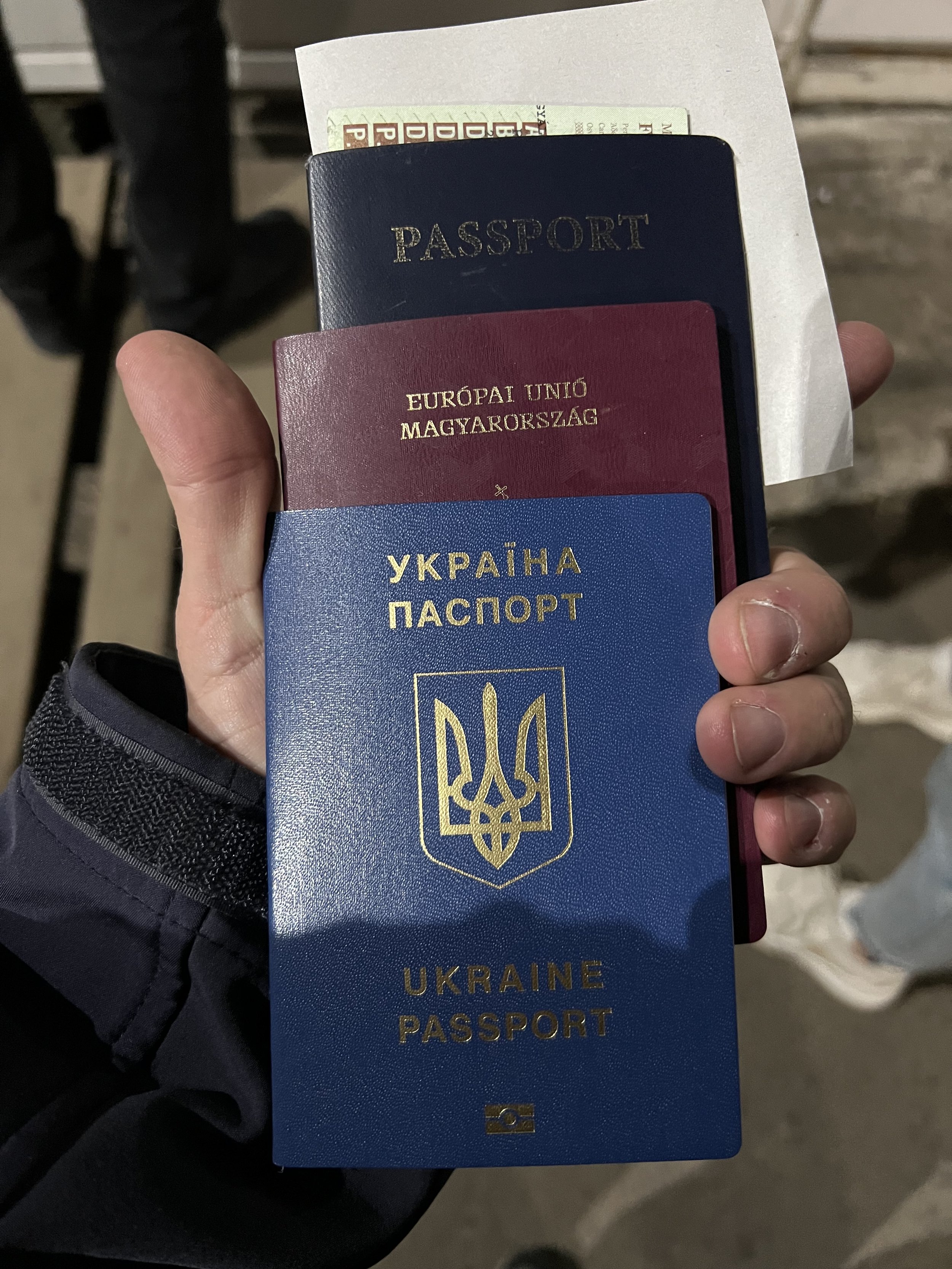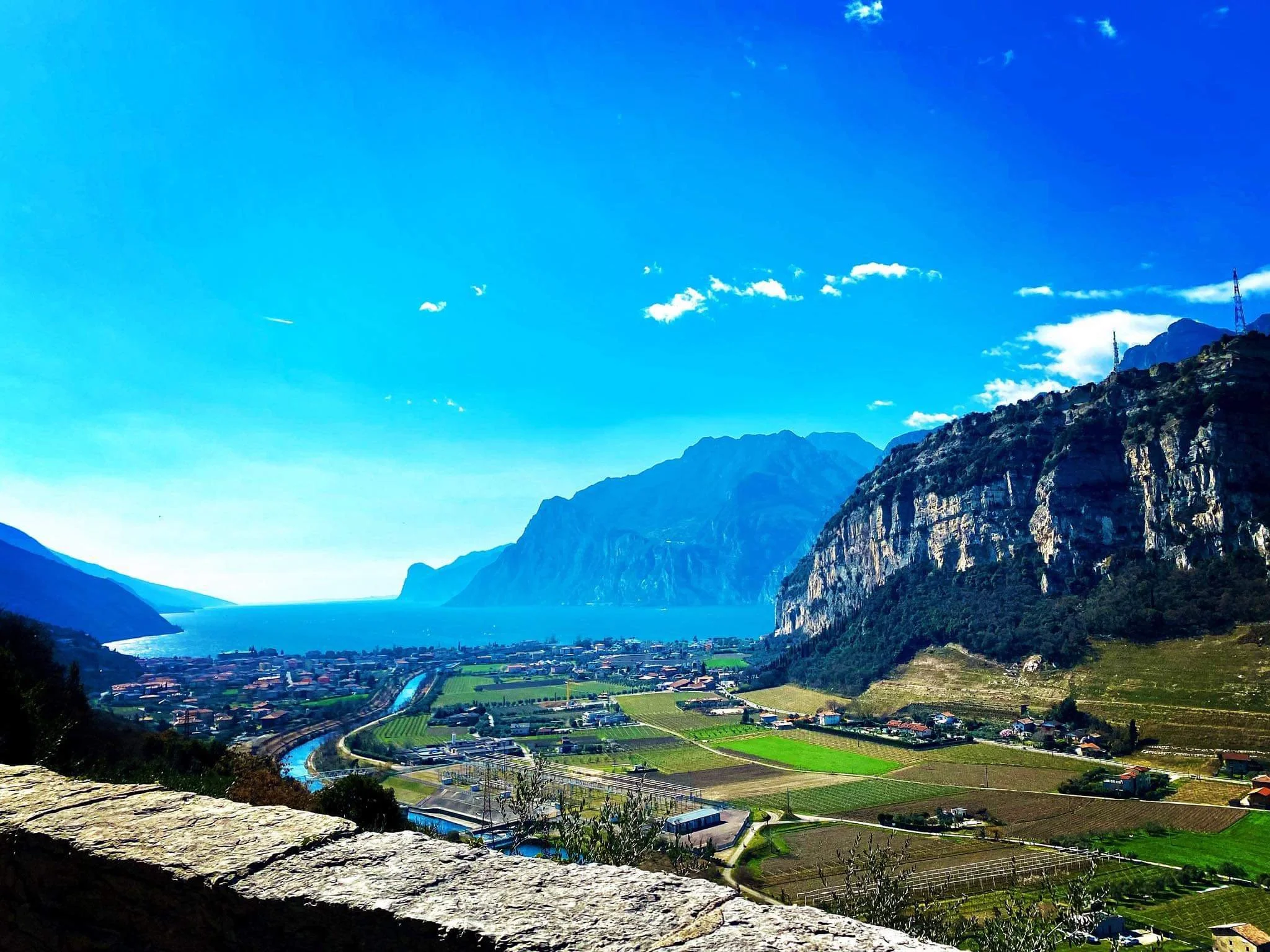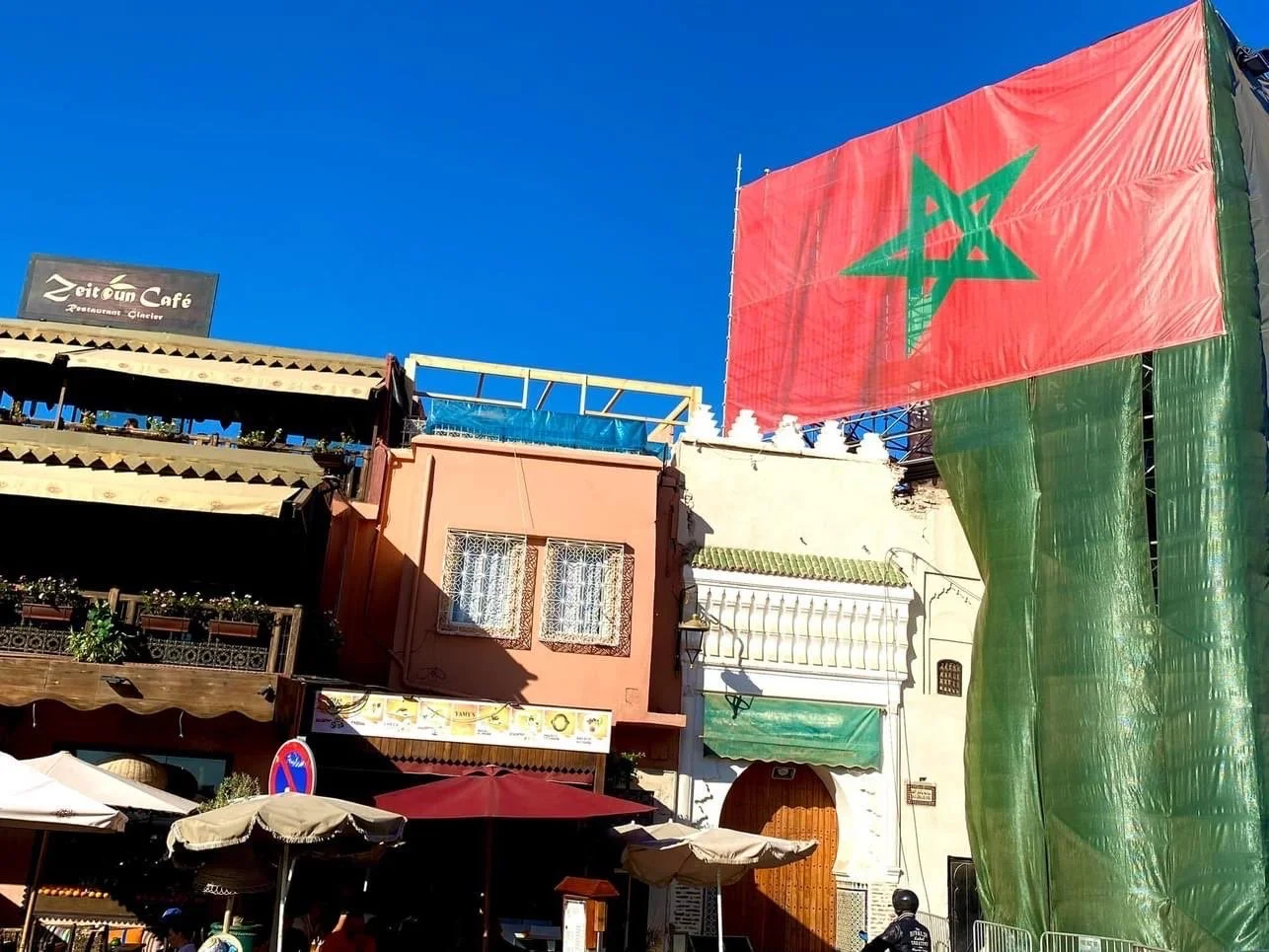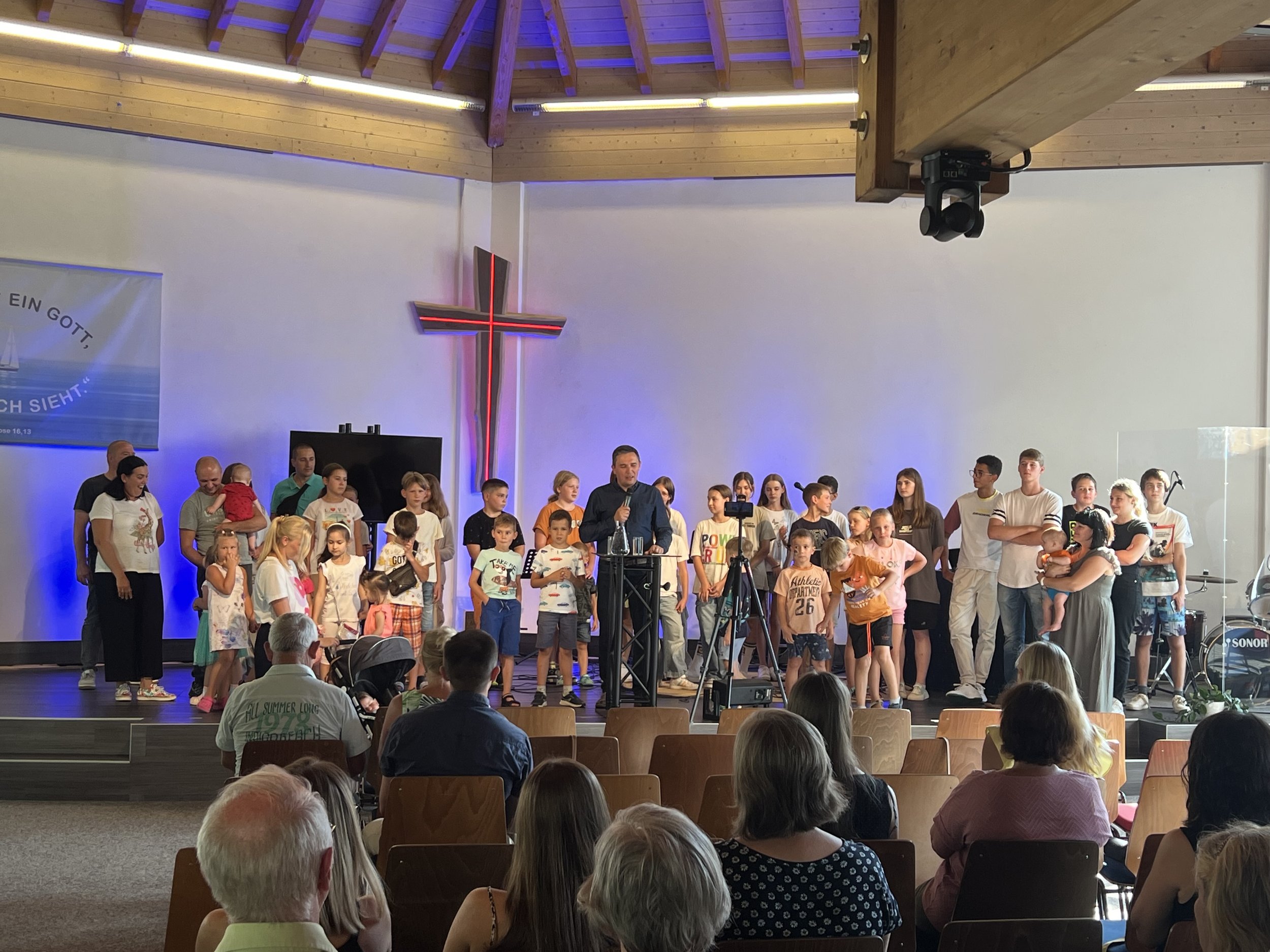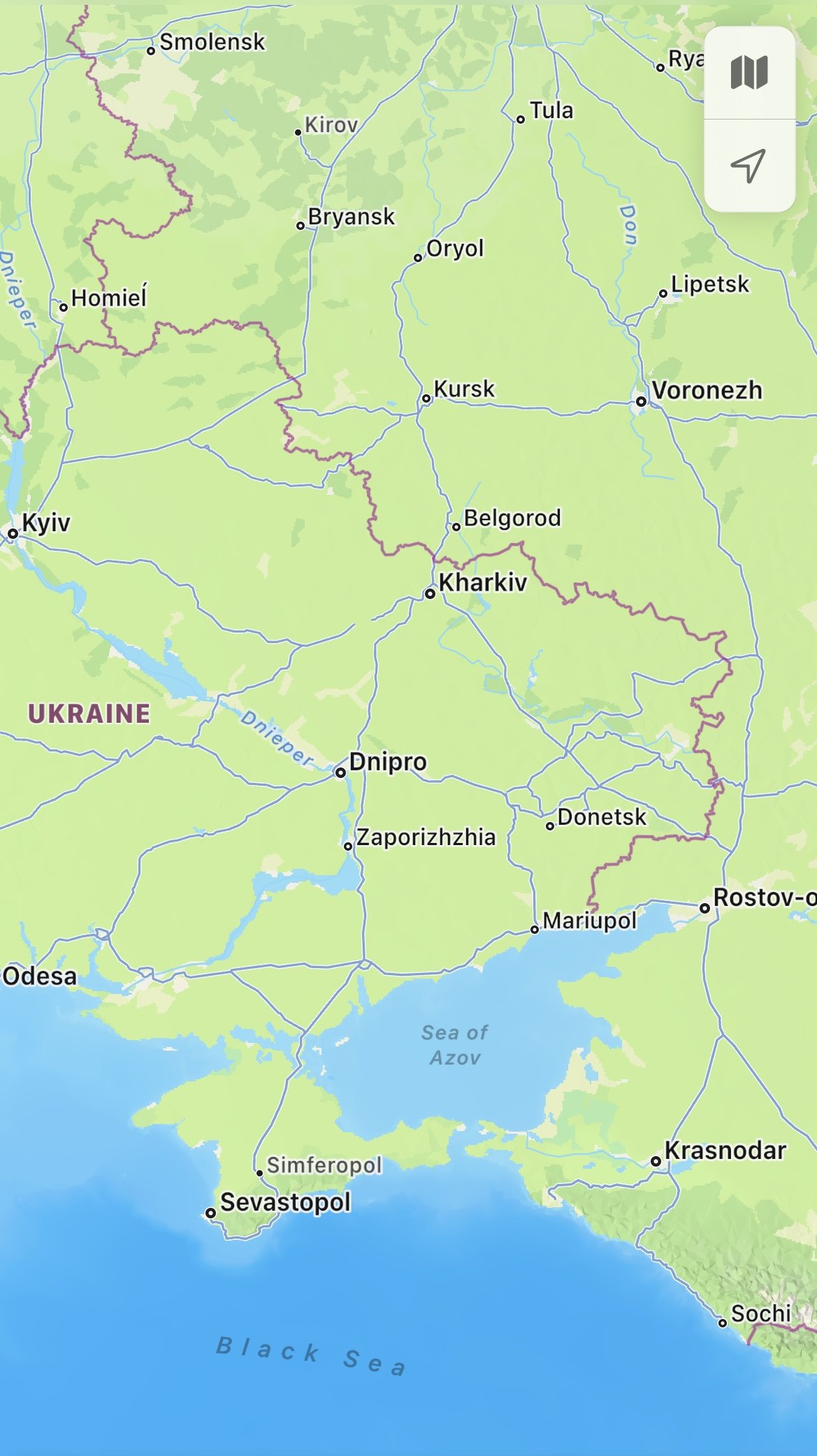“Since the war started, I have crossed the border more than 70 times. It’s part of the Church of God’s efforts to deliver much-needed supplies, food and even toys to our Church of God friends in Ukraine. There are many things I have learned. The first being that delivering supplies, like the war itself, is complex.”
In the spring and summer of 2022, a single border crossing took between 2 and 5 hours (each way). Often the Ukrainian border was slammed with heavy queues of civilians trying to get out of Ukraine. And on the Hungarian side of things, it was slammed with heavy queues of humanitarian aid workers delivering food and other supplies into Ukraine.
Two years in, I count on a border crossing taking place in about 1 hour. Often it’s a bit longer, but no more than 2 hours. And very rarely it’s 40 minutes or so. The reality is that most Ukrainians who wanted to (and were legally able to) leave Ukraine…have done so. As with any border, there are numerable ‘locals’ who cross in one direction or the other regularly, to buy certain products, to visit family, etc. But regarding humanitarian aid delivery, I’m not saying we are the only organization still making deliveries…but it sure seems that way. At least at the border crossing we go to. New guards (on both sides) are always shocked when we tell them we are delivering humanitarian aid. And old guards (by which I mean ones who have been working that post for atleast several months) always recognize us upon arrival. I would not say that we have become friends, but they remember us. Recently one yelled in Ukrainian ‘The American is back!’
Even with such lighter traffic crossing the border, though, the variables remain.
Will they simply look at the papers, take a glance inside the vehicle and then give all the necessary stamps?
Will they ask a question about some particular product we are carrying? And will that question be because they are personally interested in walking away with that product?
Will they require some or all of the products to be physically unloaded from the van?
If so, will they simply take pictures? Or will they want to cut open sealed boxes and carefully examine what’s inside?
Will they be friendly and favorable towards us?
Or for one reason or another, will they scowl at us and (presumably) look for ways to make things more difficult for us?
Even when the van is empty, will a quick glance and examination with their security devices be sufficient?
Or will they require the van to park in a special place (picture the subterranean lairs of an oil change shop) for them to more thoroughly look at the undercarriage?
Will they require us to physically leave the van so that they can unleash a drug/bomb dog inside of it to sniff all its nooks and crannies?
Will the border itself be closed? And if so, will there be other borders to try to cross through? Sometimes this has happened because nation-wide (in Ukraine), the power has been down, or the cellular/wifi service has been down, or the border has simply been closed temporarily as every agent/guard is taking cover from potential/real missile strikes.
As you can imagine, even though we do nothing illegal, of course, each of these variables carries with it some measure of stress. Additionally each of these variables lengthens the time spent at the border, and thus, adds to the already long schedule for the day. And yes, each of the above scenarios have played out on numerous occasions.
Once in the spring of 2022, I was standing inside a customs office in Ukraine, waiting for our time with the officers to process our paperwork. There was a man standing nearby in the line, clearly a fellow American. We struck up a conversation. He was delivering supplies for some NGO that he was connected with. But for both of us, the process was the same. We heard loud stamps of documents on the other side of the closed door and we both perked up. That was a beautiful sound, as it meant things were moving along bureucratically and OUR TIME was getting closer. We laughed and drew a comparison to a popular meme that’s been around, for really all the jobs.
For us (delivering humanitarian aid), it would look like this:
WHAT MY MOM THINKS I DO:
A person driving a van through a literal warzone, with the vehicle’s glass broken out and fires to the left and right, and also we are bleeding a little.
WHAT MY FRIENDS THINK I DO:
Similar situation, but not quite as extreme. Maybe less fires…
WHAT I ACTUALLY DO:
Standing in an office, waiting for the sounds of papers being bureaucratically stamped. ;-)
During the spring and summer of 2022, I was driving vans for the Church of God, as well as a separate missions agency that was in need of drivers to deliver humanitarian aid to their partners. I would cross the border at least two times a week, sometimes more. At that time, it was necessary to constantly check the clock. Each day was a race against time. You never knew how long a border crossing would take. Each way (leaving Hungary and entering Ukraine, or leaving Ukraine and re-entering Hungary) would take 2-5 hours. So it was quite difficult to plan your day as there was a large window of time that was truly uncertain! If the border crossing went quicker than normal, that left time to get back to the store (before they closed for the day) and re-load the vans so that you could make a second delivery early the folllowing morning.
If the border crossing took longer than normal, that meant some down time that evening to have a sit-down meal, which was nice. BUT…it also meant the next day would be much longer as you would first have to drive to the store to re-load the van and then turn around and drive back to the border. This also, obviously, affected our return time to Budapest. So, family life was up in the air. Will we have dinner together, or will I return home quite late, long after Sofie’s bedtime?
On the 29th of July 2022, I was not driving. I was home. In Budapest. I don’t remember the details of that day entirely, but I took a nap in the afternoon. In my own bed. I awoke after a short time sleeping, and panicked. I instantly reached for my phone and saw that it read 15:06 local time (just after 3 pm). My heart started racing and I quickly sat up. “OMG!!! It’s 1506….okay…what time does Metro (like a European Costco) close today? Or no, did we already go there? I can’t remember… Okay, if we leave right now, what time will we get to the border? And then…?
Mind you, I was in my own bed. In my own home. I was not in a strange place. BUT my mind was so consumed with managing the details of these deliveries that I really panicked!!!
Even though we are generally far from the ‘war zone,’ and not in imminent danger, the stress and exhaustion of making deliveries can be overwhelming at times.
So what does a ‘a typical delivery’ look like? Well, there is no typical delivery, but generally it looks like this:
In the days before the trip, LOTS of messages, planning and coordinating the logistics of what we will deliver, preparing the customs documents, giving the van atleast a look-over to make sure there are no glaring issues, and arranging everything for the actual trip.
Then, the delivery day begins with departure from my home no later than 6 A.M. and drive to meet up with whoever from the Hungarian Church of God that will be accompanying me. [There are at least 10 people from our Hungarian Church of God who have accompanied me, 2 have been on dozens of trips each, 2 have been on 3-5 trips each; Beyond Hungary, there are about 15 regional Church of God people who have accompanied me on a trip].
After picking up the other passenger(s), we drive several hours to the border (about 3.5 hour drive, if all goes well with the vehicle and traffic). Along the way, we stop at a large warehouse to pick up whatever supplies we do not already have loaded into the van.
Then we continue to the border, where we pray for favor!!
EVERY border crossing is totally different.
Then we drive a few hours in Ukraine to our church partner.
After greeting them, we unload the van. Then we (usually) have coffee/tea or a meal while we have conversations. Our Ukrainian friends are incredibly hospitable!!!
Then we drive the few hours back to the border, once again pray for favor, and then drive the several hours home to Budapest. If I arrive to my home before 10 PM, I am overjoyed!!!
EVEN IF all goes well, it makes for quite an exhausting day.
Oh, at the border, we must also remember to scan the stamped customs form, for accountability and record-keeping, should the physical document be destroyed or lost.
There are many variables that affect the delivery. Here are some examples of the difficult variables to manage:
TIME. You are always monitoring the clock. People are waiting for you, and you try your very best to arrive close to the window of time you’ve indicated. Oftentimes, cellular service or wi-fi is unavailable or sporadic at best. So you try to be close enough to your time that the people will either not worry or will not wait unnecessarily.
LANGUAGE. You are trying to stay cognizant of any and all Hungarian words and phrases you know, as well as any and all Ukrainian words and phrases! At the border, on both sides, it’s a rarity if you interact with a border guard that (atleast voluntarily) speaks English. Sometimes you know that they understand more than they are letting on, but you may not hear any English spoken on either side. So, you are going through even just basic words, terms and greetings to both understand what you are hearing, as well as communicate in ways that they understand.
ROAD & VEHICLE. The nature of these deliveries of humanitarian aid require vehicles to be driven hard, for long periods of times, on roads of varying quality, by drivers with different driving styles, half the time hauling basically maximum weight. THIS puts great wear and tear on the vehicle. So, you are constantly monitoring the vehicle. Are there any lights on the dashboard that should ‘not’ be there? Is the engine temperature in the good range? Are there any strange sounds or feelings with driving the vehicle? What are the tire pressures? Are there ANY concerns that require addressing immediately, or at least before the next trip? Then, what is the fuel level like? And will there be reliable fuel down the road, or do you need to top off the fuel sooner rather than later? Additionally, once in Ukraine, GPS don’t work, so you drive by memory, or landmarks. Or reading the street signs (written in Ukrainian). If a road/bridge is closed or destroyed, you have to navigate a new way either by feel (this road seems like it could connect us to that road…) or by following the verbal instructions given (in Ukrainian) by a nice border guard.
RELATIONSHIPS & COMMUNICATION. No matter the time of day, there are some people with whom you need to communicate. You need to give them an updated ETA, or let them know that all is well, or that the payment they sent went through. There are names and faces of people that you only see when making these deliveries. You try your very best to remember their name (sometimes this is NOT a normal name for an English speaker), and to remember details of their life situation. Was it their daughter that had been so terribly ill, or was that a prayer request they sent on behalf of someone else?? Additionally, you need to communicate with your church community in Budapest (and beyond) who are praying for the day’s events.
As you can surely imagine, there are many tales that I could share that carry some level of humor, or some level of divine favor/protection.
To close, I will simply tell this one.
In December 2022, a comedy of errors occurred. EVERYTHING that could go wrong, went wrong. This resulted in us not arriving to the border until 7 PM (despite leaving Budapest at 9 AM). The van was loaded to capacity with supplies, including szaloncukors (traditional Hungarian Christmas Candies). These are individually-wrapped gummy candies, coated in chocolate. A normal-sized adult hand could probably hold three of them in the palm. To bless our Ukrainian friends, we were bringing 20 kilograms (about 45 pounds) of these candies, in two unsealed cardboard boxes.
As we drove, one of them slid on top of the other supplies and shifted towards the back door. Of course, we did not realize this…
AT THE BORDER, the old Hungarian guard greeted us and was speaking to the Hungarian Church of God person with me. He apparently asked them to open the back doors, which they did. And as I got to the back of the van, holding the passports to give him, I heard a truly unusual sound. I had no idea what I was hearing, until I saw a waterfall of candies pouring out of the van onto the pavement below. There were so many of them, it literally took 30 seconds for them to finish cascading to the ground. In absolute shock at this sight, I looked at the speechless guard. Then I conjured up my very best Hungarian to say to him “Boldog Karácsonyt” (Merry Christmas). In slap-happy laughter, we got down on the ground and picked up these hundreds of (wrapped) candies, while he processed our passports and probably prayed for us to leave quickly, before anything else fell out of the van.
If you would like to give towards the Humanitarian Aid relief work, please click on this LINK and give to the Church of God Disaster Relief project, earmarked ‘Ukraine.’
As with all these stories, names and specific locations are altered or withheld for security purposes.


